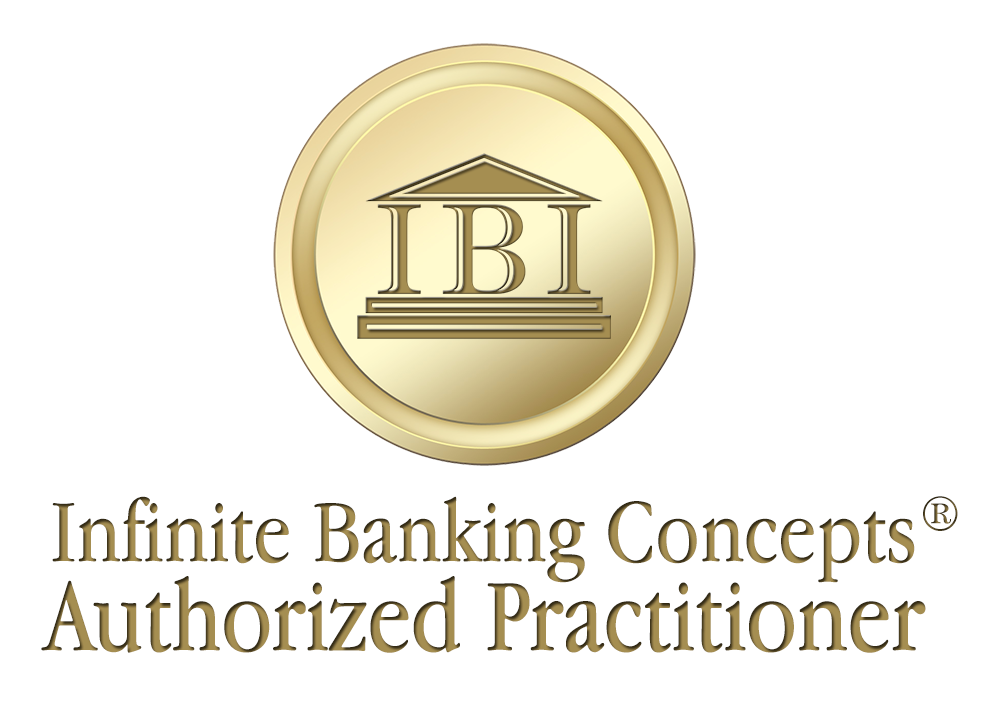Why The Infinite Banking Concept?
When people hear about IBC, Infinite Banking Concept, they have several thoughts. Some of the immediate thoughts that come to mind are:
- Dave Ramsey says that the infinite banking concept is a terrible investment. (Oh the fun I have teaching the truth.)
- The Infinite banking concept sounds too good to be true. (When you think this it is nothing more than a gut feeling encouraging you to do more research and get more information.)
- If the infinite banking concept is such a good thing, why isn’t everyone doing it? (More people and companies are than you think)
- The infinite banking concept is too confusing. (Just a sign you need a good coach to help you learn more.)
Although it is important to do our due diligence, I have found that when we spend time mired in a negative position, energy levels drop, and it is more difficult to see the whole picture. Not because there are not common sense responses to all the objections above (there are, and if you really want to examine things from that perspective we talk about some here), it’s just far more productive to deal with the positive side of the equation.
So let us turn that frown upside down and into a smile. The rest of this post will deal with the benefits of Infinite Banking Concept strategies.
Infinite Banking Concept Strategies

I have organized them into four categories:
-
Safety
-
Taxation
-
Access to capital
-
Income at retirement
1. Safety
If there is anything I have learned about wealth, it is echoed by Will Rogers, “It is easier to lose money than it is to make it.” I am in agreement with Mark Twain when he said: “I am more concerned with the return of my money than the return on my money.” Safety of your principal is – or should be – the top of your list of financial priorities. During the Great Depression thousands and thousands of banks went under. In fact, there were so many that did go under and so many Americans (my grandparents for example) who lost their life savings, banks, in general, lost all credibility and trust. In an attempt to restore that faith and credibility for the banking industry, Congress, acting on behalf of President Franklin Roosevelt, created the Federal Deposit Insurance Corporation, or FDIC. Since then, there have also been other government-sponsored entities created, such as the Pension Benefit Guaranty Corporation (PBGC), or even the Securities Investment Protection Corporation (SIPC). These are government-sponsored insurance agencies that serve as backstops for banks, pensions, and brokerage firms, respectively, in the event of failure by any institution within the group. It may come as a surprise to you then that there is no equivalent government-sponsored agency that intervenes in the failure of insurance companies! If you aren’t already, you should be asking yourself “Why not?” The short answer is they (the insurance industry) have never needed the government to step in. Even during the Great Depression, life insurance companies have never faltered in promised payments to the American public. It is true there are a few companies that have gone out of business, but those companies and the whole life policies they own have been absorbed by other insurance companies so the policyholders have never lost money.
Why are life insurance companies so safe?
- Life insurance companies are non-transactional. Unlike banks and financial institutions, they cannot engage in fractional reserve accounting. Their investment portfolios are structured, conservative and regulated by each individual state. Because of their long-term track record, they can guarantee growth, unlike any stock or mutual fund account.
- Life insurance companies have a 100% reserve base. Policy loans are based on 1:1 reserves, meaning that for every dollar loaned there is an actual, physical dollar held in reserve to back that loan. This policy does not lead to inflation like the Federal Reserve’s policy of fractional lending which allows a bank to lend out $10 for every $1 kept in reserve; money can be created out of thin air for every dollar that is deposited with a bank. This puts bank deposits at much greater risk in the event of a financial catastrophe. The 100% reserve base reinforces the overall strength and prudence of life insurance companies. This is one of the reasons why cash values remained 99.9% safe during the Great Depression while over 10,000 banks failed during the same period.
- Life insurance companies have regulated protection. The State Insurance Commissioner mandates reserve pools, as well as guaranty associations to protect policyholders against a company default. Regulation at the state level has proven to be much more effective than federal regulations in protecting the interest of individuals over corporations. Life insurance companies are state regulated, whereas federally chartered banks and financial institutions are regulated at the federal level.
- Life insurance companies have a second layer of protection which is un-regulated. In addition to the regulated protections, your personal banking system is protected is through re-insurance. Life insurance companies willingly purchase insurance from reinsurance companies to spread the overall risk amongst even more consumers and provide more safety to the individual policyholders.
- Life insurance companies rely on long-term planning and investing. The professional money managers at life insurance companies do not chase performance like most hedge fund and mutual fund managers. They are looking out 5, 15 and 40 years down the road. They also diversify by industry, maturity & geography. This keeps costs and risks very low. These money managers always keep in mind that the most important thing is the guarantees/promises made by the company. They act accordingly.
How are you personally protected by the infinite banking concept?
- Creditor and Predator Protection. 100% of cash values inside life insurance policies are protected from creditors and judgments in most states. Levels of protection vary by state. Contact us to understand the laws in your state.
- Decreasing Marginal Costs. The premium and death benefits have a decreasing marginal cost. Thanks to guaranteed premiums, compounding after-tax rate of returns and inflation, every premium paid is cheaper than the previous one.
- Inflation fighter. The guaranteed growth within a whole life contract cushions a family from uncertainty.
- Accelerated Death Benefits. In the event that you are diagnosed with a terminal illness, you can receive a large portion of your death benefit while you are alive.
- Inflation fighter. The guaranteed growth within a whole life contract cushions a family from uncertainty.
- Long-Term Care Riders. This rider provides for payment of long-term care.
- Guarantees. Policyholders receive a guaranteed internal rate of return that never adjusts over time. Premiums in a whole life contract are guaranteed to remain the same throughout the life of the policy. Your beneficiaries are guaranteed to receive the death benefit when you pass. Once dividends are declared, they cannot be taken away.
- Waiver of Premium. In the event that you become permanently disabled the waiver of premium, rider maintains that your base insurance premium continues to be paid by the life insurance company.
- Annuitization of Cash Values. You can turn your cash values into an annuity that will guarantee a lifetime stream of income. This benefit may help you or your spouse in qualifying for Medicaid.
- A Will Unto Itself. With a life insurance contract, you can simply and easily change beneficiaries and divide proceeds without going to a lawyer.
- No Probate. Life insurance bypasses the probate process because it is a legal contract and will unto itself. It is not included in the gross estate during probation. This means that the enormous probate costs and fees can be avoided.
- Independence. Life insurance makes owners and beneficiaries less dependent upon government relief. I personally feel much more comfortable with an industry that has kept its promises for nearly 200 years, versus the government, who is on the verge of defaulting on their promise (made only 80 years ago) to pay social security to retire individuals.
2. Taxation
Quick questions: Do you believe taxes are going to be higher in the future? Yes or no? Do you think they are going to be a lot higher? Do you want to pay those taxes? If you want to pay them, you can skip this section. How do you prevent the payment of taxes from harming or even completely destroying your retirement? Do you have a strategy to avoid that? What if there was a way to use taxes for your benefit?
Remember that over your lifetime, the single biggest expense you incur is probably payment of taxes. When you have any kind of financial increase, whether, in the form of a salary, paycheck or a return on your money, you are required to pay a tax. However, most people do not know that the tax payment on the increase on your money can be avoided through the infinite banking concept.
I think I can explain with a story.
Let’s imagine for a minute you are a farmer in Iowa and recently purchased the family farm from your Dad. It is 4:30 a.m. on January 10th and it is -25 degrees outside when you get out of bed just like you do in the summertime. You go into the kitchen and prepare your favorite hot drink to get the day started. You are just taking your first sips when you hear a knock at the door. You open the door to find the somebody from the Internal Revenue Service standing there in the cold January air. You invite him into your kitchen and offer him a cup of your hot drink to warm him up. After a few pleasantries, you finally have to ask, “Why are you at my house at 4:30 in the morning?” At this point, the IRS representative gets totally serious, almost gruff and says, “Now you listen to me. We are going to ask you a question, one time and one time only. How you answer will determine how the Internal Revenue Service is going to deal with you from now on. Are you ready for the question? From this day forward, do you want us to take tax from your seeds or do you want to pay tax on the harvest you reap from those seeds?” Without much hesitation, you respond emphatically, “Well that is obvious, I want to be taxed on my seeds!” The Internal Revenue Service agent get a really curious look on his face and asks “If it is so obvious, why are you not doing that with your money?”
And that is a question you should ask yourself. Why would you wait to be taxed on your “harvest” (money after it’s growth), when you could instead pay taxes on your “seed” (money before it’s growth)? Here’s a short list of tax benefits that come with the infinite banking concept:
- You are able to pay taxes now, on your “seed” (and taxes right now are historically low).
- You can effectively transfer your money to the future without taxes. There is no annual taxation on cash value increases or dividends (your harvest).
- You can access that money while it is growing without any penalties or income taxes.
- You’ll receive income tax-free earnings from your account while in retirement.
- You are able to transfer money you grew into your system to your heir’s income tax-free.
Do you really think the government wants a lot of people involved in these systems? The answer is absolutely not. The government NEEDS revenue. It needed revenue yesterday, needs revenue today and the government has an insatiable need for more revenue. Do you honestly think that need will go away or diminish? This might be a reason why the sale of the infinite banking concept is so highly regulated and advertising is so restrictive that almost nothing of substance can be said in any form of advertisement. Isn’t this valuable information? Shouldn’t you, your business and the people you care about be taking advantage of an account like this while it is still easy to do so?
Here are a few other ways that you can avoid taxation:
- Income Tax-Free – Life insurance death benefits are income tax-free. If your estate doesn’t exceed the federal exemption limit. This means your heirs will receive and be able to keep more money.
- Estate Tax-Free – With proper planning, life insurance proceeds can be received free of estate taxes.
- 1035 Tax-Free Exchanges – Increased life expectancies, improved underwriting, and preferred discounts mean that in some cases, newer policies may be better than existing policies. If this course is beneficial, you can exchange policies tax-free.
3. Access To Capital
During our lifetime there are probably several instances in which we need capital over and above our normal cash flow to purchase things we want or need – a vacation, car or home purchases, college tuition. What good is money put away for the future if we need to use some of it today? In my house, we have a saying: “Value is in use.” Cash values inside whole life insurance have infinite uses. What are some of those uses?
- Flexibility. Your capital is flexible so you get multiple uses for each dollar! Typically, we allocate dollars into individual “buckets” that meet specific needs or wants. We have our savings bucket, our retirement bucket, our investment bucket and our insurance bucket. A dollar placed in any one of these buckets serves one specific need. However, the infinite banking concept can perform simultaneous jobs such as life insurance protection, personal savings, financing, a warehouse for investment dollars, retirement & estate planning. Your options are infinite and interchangeable. With this system, you can truly use a dollar more than once.
- The LUCE (Liquidity, Use, Control. Enjoyment) factor. With a life insurance policy, you own the contract of and you control it. You get first right to the funds in your policy instead of having them locked up while the institution uses them like qualified retirement plans do. There are no fees or penalties for using the cash values that you’ve accumulated inside the policy. Since the funds are completely liquid, you can do with them as you choose. There are no rules pertaining to what you are allowed to use the cash values for or when you’re allowed to use them. Using the cash value for your own enjoyment is encouraged, not prohibited.
- Policy Loans. It wouldn’t be a personal banking system if you couldn’t make loans! By making and repaying loans you are able to recapture the principal, interest and lost opportunity cost of the dollars that you used to send to other financial institutions. The average American spends 35% of every dollar they earn paying interest. The infinite banking concept can eliminate your dependence on third-party financiers for credit approval and financing. Having instant access to funds improves your negotiating position, makes you more self-reliant and gives you more confidence. Since you own the infinite banking system, you have full control of rates, payment programs, and schedules.
- Private capital/Line of credit. The infinite banking concept allows one to build private capital via cash values which can be used as an instant line of credit. Many people prefer to build equity outside of their homes rather than paying them off. Why? It offers them liquidity in case of emergency and maximizes their taxable mortgage interest deduction. The infinite banking concept not only offers safety and guaranteed growth but also this type of liquidity. Have you ever thought about where you would get money in the event of a permanent disability, illness, market decline, or loss of a job? What if a natural disaster like Hurricane Katrina wiped out your home? During such events, it is very hard to pull equity out of your home. After all, you have to qualify for the loan…which you may be unable to do in an emergency situation like these.
- Wash loan. When a policy loan is requested, the interest on that loan is deducted from the top. However, the policy continues to earn interest and dividends as if the money was never taken out of the account. In addition, when you take a policy loan, the interest charged is based on a daily rate, not an annual rate, therefore principal payments made during the year receive a reimbursement of the prorated interest charged. So, if you are charged 5.75% interest on the loan, but your account continues to earn 6%, the cost of the loan is a wash. Add in the prorated interest and you come out ahead.
- Lost opportunity cost minimized. Many people falsely believe that they have no lost opportunity cost when they pay cash for everything. The reality is every purchase is financed. When you pay cash you lose the opportunity for that money to grow. When your money is in a cash value-rich policy your money continues to earn no less than the guaranteed rate of return and dividends whether the funds remain unencumbered inside the infinite banking system or are used as collateral for policy loans.
- Virtually Unlimited Contributions. The infinite banking concept is not capped by the government or restricted by your Adjusted Gross Income as the case is with Roth IRA’s. This means the amount of capital you have access to is limited only by how much you contribute.
4. Income At Retirement
In study after study, one of the biggest concerns Americans have is outliving their money. What benefits are there to a whole life insurance that provide sufficient income at retirement?
- Asset Allocation. Hopefully, when you reach retirement you will have multiple assets. A cash value weighted policy will help you make decisions as to which order to “use up” assets for your retirement income. A whole life policy gives you a cushion so you can spend down your other assets (a 401(k) and other risky investments) will potentially place a burden on your heirs if left to them. While you spend down these assets the cash values, dividends and death benefit of your policy will continue to grow tax-free. Plus, the liquidity and income tax-free characteristics of life insurance are great benefits for heirs, whereas, qualified retirement plans can be a tax nightmare for them.
- Pension Maximization. Pension benefits are fully taxable as ordinary income. Life insurance proceeds are income tax-free meaning that income derived from a life insurance policy will be larger every month than under the traditional pension. Plus, pension benefits don’t pass to heirs if both retiree and spouse die simultaneously.
- Annuitization of Cash Values. You can turn your cash values into an annuity that will guarantee a lifetime stream of income. This may also help you or your spouse in qualifying for Medicaid.
- Dividends. While dividends are not guaranteed, many insurance companies have paid a dividend every year without interruption for 100+ years, including during the 2 World Wars, the influenza pandemic and the Great Depression. Your dividend is simply your percent of the company profits based on your percentage ownership of the company. This percentage is based on your death benefit, cash values, and age of the policy. With each passing year, your dividend increases. The dividend is a source of income you cannot outlive.
- Virtually Unlimited Contributions. The infinite banking concept is not capped by the government or restricted by your Adjusted Gross Income as the case is with Roth IRA’s. In other words, the amount you have for retirement cannot be limited by the government.
By Jason I. Henderson, Ph.D.
To learn more about the Infinite Banking Concept call (435)764-1451 for a FREE consultation OR join us for “7 Keys To Financial Freedom”.









Trackbacks & Pingbacks
[…] Always remember as a life insurance policy owner, you have an asset, not just an expense. Life insurance is not like home insurance or car insurance. Generations can be blessed financially with the wise purchase and use of life insurance. Sadly, the mainstream financial planners don’t understand and teach these principles. I want every one of my clients to know, understand and live the principles discussed here and in other posts in this blog; like this one. […]
[…] Regardless of which you are, we believe there is a way for this information to help you by using the power of certainty and leverage. Yes certainly. Rarely, if ever, will you hear financial gurus talk about certainty, but that is exactly what everyone needs. You can learn more here. […]
Leave a Reply
Want to join the discussion?Feel free to contribute!